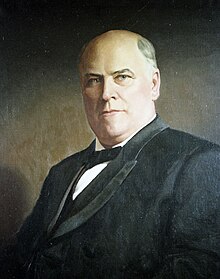Robert Broadnax Glenn
| Robert Broadnax Glenn | |
|---|---|
 |
|
| 51st Governor of North Carolina | |
|
In office January 11, 1905 – January 12, 1909 |
|
| Lieutenant | Francis D. Winston |
| Preceded by | Charles Brantley Aycock |
| Succeeded by | William Walton Kitchin |
| Personal details | |
| Born |
Robert Brodnax Glenn August 11, 1854 Rockingham County, North Carolina, U.S. |
| Died | May 16, 1920 (aged 65) |
| Political party | Democratic |
| Spouse(s) | Nina Deaderick |
| Children | 2 |
| Alma mater |
Davidson College University of Virginia |
| Profession | Lawyer, politician |
Robert Broadnax Glenn (August 11, 1854 – May 16, 1920) was the 51st Governor of the U.S. state of North Carolina from 1905 to 1909.
A native of Rockingham County, North Carolina, Glenn was born to C. L. Glenn and Annie S. Dodge. He graduated from Davidson College in 1874(?), then attended the University of Virginia law school for a year then studied law under Chief Justice Richmond Mumford Pearson. He began practicing law in Stokes County before moving to Winston-Salem, where he joined the law firm of Glenn, Manly & Henderson, a predecessor firm to the modern-day Womble Carlyle Sandridge & Rice PLLC. In 1885, he became prosecuting attorney for the state's ninth district. From 1893 until 1897, he served as United States Attorney for the Western District of North Carolina. Glenn was elected to the North Carolina Senate in 1898.
Glenn was known as the "Prohibition Governor" for his successful 1908 campaign to ban liquor statewide. Glenn was also interested in conservation, as evidenced by his remark at the National Governors Association meeting of 1908: "our forests are being denuded...the failure of the People throughout the States to protect the great forest industry of our country...is one of the chief sources if not the greatest source of all [natural resource waste]...Our People, regardless of the future, have been living only for the present, thinking of themselves and not of their children and their children's children."
...
Wikipedia
